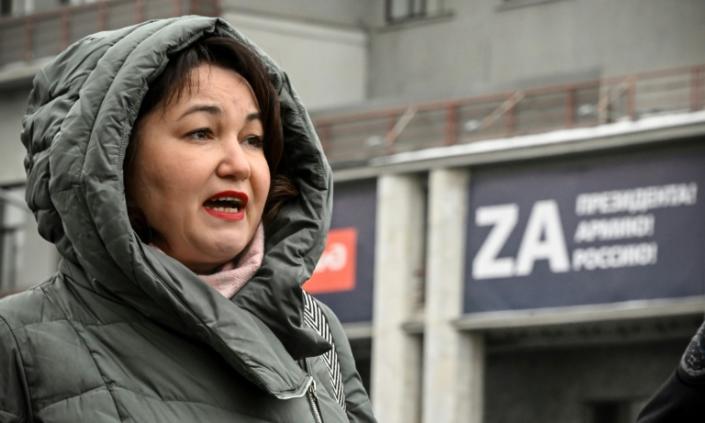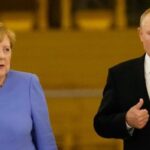
Russian President Vladimir Putin on Friday told a group of mothers whose sons are fighting in Ukraine that he shares the pain of those who have lost their loved ones in the conflict.
The carefully-choreographed meeting at Putin’s residence took place as anger simmers in Russia over a chaotic military draft and deaths of soldiers in Ukraine.
“I want you to know: I personally and the entire leadership of the country share this pain,” Putin told a group of soldiers’ mothers ahead of Mother’s Day, which Russia will mark on Sunday.
“We understand that nothing can replace the loss of a son, a child,” Putin said in his opening remarks which lasted just a few minutes.
The Russian leader, who has introduced legislation that effectively bans any public criticism of the offensive, also told the 17 women they should be wary of what they read on the internet.


“It is clear that life is more complex than what is shown on our TV screens or even on the internet, nothing can be trusted there,” he said.
At least one woman at the meeting wore a black headscarf, apparently marking a recent loss.
Anger and concern have built across Russia since September, when the Kremlin announced that hundreds of thousands of well-trained and well-equipped men would be conscripted and sent to the battlefield to bolster Moscow’s struggling campaign in Ukraine.
But chaos ensued, with widespread reports of exempted men — the elderly or infirm — being dispatched to the front or conscripts dying after receiving nearly no training, forcing the Kremlin to concede “mistakes”.
The meeting — the first of its kind since Putin launched the offensive on February 24 — is a sign that the Kremlin takes the growing malaise seriously.
Ahead of Putin’s meeting some activists said the Kremlin meeting would not offer a platform for frank discussion.
“The president will meet with some mothers pulled out of his pocket, who will ask the right questions and thank him,” said Olga Tsukanova, an activist mother.
“As usual.”
Her 20-year-old son is currently undergoing his military service and she wants to make sure he will not be sent to Ukraine.
Last week Tsukanova travelled around 900 kilometres (560 miles) from the city of Samara on the Volga river in the hope of being seen at the Kremlin.
– ‘Invite us, Vladimir’ –
“I’m not alone. Invite us, Vladimir Vladimirovich, answer our questions!” she told AFP ahead of the Kremlin meeting, referring to the president by his patronymic.
Tsukanova was never invited to attend the meeting with Putin.
Anger over the fate of mobilised men, which risks degenerating into real discontent, has put the Kremlin in an uncomfortable position, analysts say.
While authorities have unleashed an unprecedented crackdown on political dissent while troops fight in Ukraine, the word of mothers appears sacred in Russia.
Imprisoning them is not an option, observers say.
For Putin, the sight of angry relatives may bring back difficult memories from the start of his rule more than two decades ago.
In August 2000, the Russian leader was criticised for responding too slowly when the Kursk submarine sank, killing all 118 crew onboard.
Two wars in Chechnya led to the rise of the mothers’ movement in Russia that became a thorn in the Kremlin’s side.
But this time the climate is different, with no independent media left in the country and an effective ban on public criticism of Putin’s offensive.
This means there has been little public questioning of the military campaign in Ukraine. But in Russia some are asking questions about the conditions in which their husbands and sons are sent to fight.
– ‘Not a peace movement’ –
Mothers’ and wives’ status as relatives of mobilised men serving the country gives them a form of protection.
“There is a subconscious feeling that women have that right” to hold power to account, sociologist Alexei Levinson of the independent Levada Centre said.
“But this is not a woman for peace movement,” he warned.
“They want the state to fulfil its responsibility as a ‘collective father’ towards the mobilised.”
For now, the soldiers mothers’ movement is uncoordinated and disparate, mainly consisting of worried relatives posting videos on social media, where some informal groups have formed.
This is how Tsukanova, who has links to controversial figure Svetlana Peunova — accused in Russia of spreading political conspiracy theories — became involved in the mothers’ movement.
In a climate of suspicion not seen since the Soviet era, many women fear that complaining about the offensive could mean trouble and refrain from speaking to the foreign press.
“We have sent letters to authorities,” one woman told AFP anonymously.
“It’s not the journalists that will take our guys out of the trenches and we do not want to harm them even more.”
bur/rox




